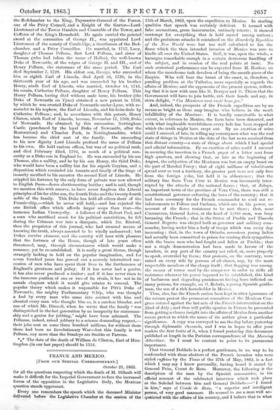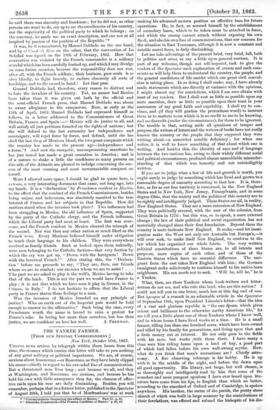October 21, 1863. OF all the questions respecting which the
death of M. Billault will make it difficult for the Imperial Government to face the increased forces of the opposition in the Legislative Body, the Mexican question stands uppermost.
Every one remembers the speech which the deceased Minister delivered before the Legislative Chamber at the session of the
13th of March, 1862, upon the expedition to Mexico. In sterling qualities that speech was certainly deficient. It teemed with false accusations, gross inaccuracies, untimely retorts ; it showed contempt for everything that is held sacred among nations ; and the gratuitous attacks it contained on the disorderly Republics of the New World were but too well calculated to fan the flame which the then intended invasion of Mexico was sure to kindle all over the United States. Still, it was, upon the whole, a harangue remarkable enough in a certain dexterous handling of the subject, and in evasion of the real points at issue. No such oratorical performance can be expected from M. Readier, on whom the unwelcome task devolves of being the mouth-piece of the Empire. Who will bear the brunt of the onset, is, therefore, a pliszling problem at the 'Tuileries, more especially as regards the affairs of Mexico; and the opponents of the present system, reflect- ing that it is now with men like M . Berryer and Al . Thiers that the Government will have to join battle, rub their hands and say, in stern delight, " Ces Messieurs vont avoir beau jeu."
And, indeed, the prospects of the French expedition are by no means so bright as those may imagine who believe in the mock infallibility of the Afoniteur. It is hardly conceivable to what extent, in reference to Mexico, the facts have been distorted, and with what implacable watchfulness every hole has been stopped at which the truth might have crept out. By no exertion of mine could I succeed, of late, in telling my countrymen what was the real state of things in M exico at the date of the last news received from that distant country—a state of things about which I had special and official information. By no exertion of mine could I succeed in securing the insertion in a French paper of a letter sent from high quarters, and showing that, as late as the beginning of August, the subjection of the Mexicans was but an empty boast on the part of Marshal Forey ; that of eight millions of inhabitants spread over so vast a territory, the greater part were not only free from the foreign yoke, but held it in abhorrence ; that the military line from Vera Cruz to Mexico was incessantly inter- rupted by the attacks of the national forces ; that, at Jalapa, an important town of the province of Vera Cruz, there was still a constitutional governor enforcing the laws of the country ; that it had been necessary for the French commander to send out re- inforcements to Folveu and Pachuca, which are in his power, on account of the fierce resistance to be met there ; that, near Cuernavaca, General Leivu, at the head of 2,000 men, was busy harassing the French ; that in the States of Puebla and Tiascola General Negreto was obeyed both as governor and military com- mander, having under him a body of troops which was every day increasing ; that, in the town of Orizaba, seventeen young ladies had actually been committed to prison for venting their sympathies with the brave men who had fought and fallen at Puebla ; that not a single demonstration had been made in favour of the invaders, in any part of the country not ruled, or, more properly to speak, overruled by them ; that protests, on the contrary, were raised on every side by persons of all classes, nay, by the most respectable members of the clergy itself ; that flogging was among the means of terror used by the conqueror in order to stifle all resistance wherever his power hapened to be established, this kind of barbarous and degrading punishment having been inflicted on many persons, for example, on M. Rebel°, a young Spanish gentle- man, the son of a rich householder in Mexico.
Tus, also, has the French nation been kept in utter ignorance of the solemn protest the permanent committee of the Mexican Con- gress entered against the last acts of the French intervention on the 22nd of July ; and thus will public opinion in France be prevented from getting a clearer insight into the affairs of Mexico from another recent protest to which the name of its author gives a particular significance. A copy was conveyed to me the day before yesterday through diplomatic channels, and I was in hopes to offer your readers the first fruits of it, when I found yesterday this document published at length in the Parisian correspondence of the Morning Advertiser. So I must be content to point to its paramount importance.
That General Doblado is a perfect gentleman, in no way to be confounded with those abettors of the French invasion who were styled ruffians by the Times of the 27th of May, 1862, is a fact which I may say I know personally, having heard it stated by General Prim, Count de Reus. Moreover, the following is the description of the man by the Spanish commander, in his official account of the celebrated interview which took place at the Soledad between him and General Doblado :—" I found in him," says el Conde de Rena, "a superior and intelligent person, of very good manners. He seemed to me a man well ac- quainted with the affairs of his country, and I believe that in what
he said there was sincerity and frankness ; for he did not, as other persons are wont to do, cry up to me the excellencies of his country, nor the superiority of the political party to which he belongs ; on the contrary, he made me an exact description, and one not at all inspired by passion of the position of the Republic."*
It was, be it remembered, by Manuel Doblado on the one hand, and by el Conde de Rens on the other, that the convention of La
Soledad was signed on the 19th of February, 1862. How that convention was violated by the French commander is a military scandal which has been carefully hushed up, and which I may divulge on some future occasion, because the responsibility does not rest, after all, with the French soldiers ; their business, poor souls is to obey blindly, to fight bravely, to endure obscurely all sorts of hardships, and to die sword in hand ! Let that pass.
General Doblado had, therefore, every reason to distrust and to hate the invaders of his country. Yet, no sooner had Mexico been taken than it was given out both by the official and the semi-official French press, that Manuel Doblado was about to swear allegiance to the conquerors. Now, as early as the 1 1 th of April, 1862, Manuel Doblado had expressed himself as follows, in a letter addressed to the Commissioners of Great Britain, France, and Spain :—" Mexico will do justice to all, and will satisfy all just petitions founded on the rights of nations ; but she will defend to the last extremity her independence and sovereignty, will repel force by force, and defend, until she has shed the last drop of Mexican blood, the two great conquests which the country has made in the present age—independence and reform." .1. And now the energetic, uncompromising manifesto he has just issued has made a great sensation in America ; and is of a nature to shake a little the confidence so many persons on this side of the Atlantic are pleased to indulge concerning the suc- cess of the most cunning and most unwarrantable conquest on record.
Were I allowed more space, I should be glad to quote here, in extenso, a very interesting document that came, not long ago, into my hands. It is a " declaration" by Frenchmen resident in Mexico, to the effect that the conduct of the French Commissioners, besides being unjust and indecorous, was absolutely unsuited to the true interest of France and her subjects in that Republic. How did matters stand when the invasion took place? Two influences had been struggling in Mexico, the old influence of Spain, supported by the party of the Catholic clergy, and the French influence, which the Liberal party had most at heart. The first was over- come, and the French resident in Mexico cheered the triumph of the second. Nor was then any other nation so much liked as the French were. Every Mexican believed himself under obligation to teach their language to his children. They were everywhere received as family friends. Such as looked upon them unkindly, were men belonging to the Catholic faction—that very faction by H hich the cry was got up, " Down with the foreigners ! Down with the heretical French ! " After stating this, the "Declara- tion " before me proceeds to say, " They are, then, our friends whom we are to combat; our enemies whom we are to assist ! . . . The part we are asked to play is the wolf's, Mexico having to take that of the lamb. This is not the part we would have France to play ; it is not that which we have seen it play in Greece, in the Crimea, in Italy." I do not hesitate to affirm that the Liberal party in France shares these feelings to a man.
Was the invasion of Mexico founded on any principle of justice? Who on earth out of the Imperial pale would be bold enough to answer in the affirmative? Such being the case, every Frenchman worth the name is bound to raise a protest for France's sake. In loving her more than ourselves, but less than
justice, we are confident we love her well. A FREEMAN.































 Previous page
Previous page